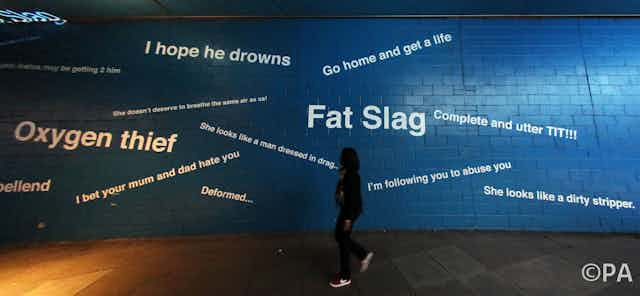There is a vocal minority on social media that use the platforms to attack others, often with impunity.
These cyber bullies or online trolls, use words and in some cases other means to cause harm – for example releasing sexually explicit images, referred to as “revenge porn”.
A recent case is that of Chloe Madeley, daughter of daytime television presenters Richard Madeley and Judy Finnigan, who received abuse including death and rape threats on Twitter following her mother’s comments on the case of footballer and convicted rapist Chad Evans.
With social media sites such as Facebook and Twitter barely a decade old, the UK House of Lords Select Committee on Communications looked into the nature of online abuse. In its report in July the committee stated:
Our overall conclusion is that the criminal law in this area, almost entirely enacted before the invention of social media, is generally appropriate for the prosecution of offences committed using the social media.
So why now the fuss about the Criminal Justice and Courts Bill? Well, it extends jail sentences to two-years for those guilty of online trolling and abuse. Why has the view emerged that the internet is such a potential threat to the social order that the only option is more laws?
Laws already exist, and are used
The Lords committee was quite correct in that existing legislation can be applied to online acts. Part 1 of the Public Order Act 1986 covers abusive and threatening words and writing likely to cause distress. Parts 3 and 3A cover the dissemination of material aimed at stirring up racial, religious or sexual hatred. The Protection from Harassment Act 1997 includes online stalking. The Malicious Communications Act 1988, which is very broad in scope, sanctions sending grossly offensive, indecent, threatening or false electronic messages for the purposes of causing distress. And the Communications Act 2003, even wider in scope, sanctions the use of a public communications network for sending grossly offensive or menacing messages.
In fact these laws have already seen convictions and injunctions handed down by the courts for online behaviour. For example, the case of the Tales of the Holohoax, in which a comic book aimed at casting doubt on the existence of the Holocaust was deemed racially inflammatory. Or the case of an animal rights protester who published a graphically manipulated photograph he’d taken of an animal testing lab’s security guard in a way that was deemed harasssment.
In other examples a teenager posted death threats on Facebook, a man attempted to blackmail a student by distributing intimate photos of her on the internet, and another student posted racially offensive comments on Twitter about a footballer. Two Twitter users were jailed for menacing a feminist campaigner.
What would new laws bring?
In most of these cases the defendants are liable for a summary conviction at a magistrates’ court and imprisonment for no longer than six months (51 weeks for harassment or stalking), or a fine. The proposed amendments to the law stem from the view that the law as it stands is not sufficient deterrent for those acting online.
The Criminal Justice and Courts Bill would modify the Malicious Communications Act 1988 to allow, on indictment, up to two years’ imprisonment for more serious offences or up to 12 months for less serious offences warranting a summary conviction. Amendments to the Bill also include a new offence to address the problem of revenge porn.
It is certainly true that cyber bullying and revenge porn cause serious and often irremediable damage and are especially aggravating due to the fact they frequently target women and girls. So there’s a legitimate argument that making them specific crimes would make society’s disapproval of such behaviour clear.

Better, not bigger, sticks
However, that would require careful drafting of well-tailored legislation. If the long list of offences above shows anything it is that legislators have a tendency to produce sweeping, far-reaching and often ill-defined provisions. These have sometimes been applied very rigidly by courts, resulting in sentences that seem severe, if not wholly arbitrary.
This is exactly what happened in the case of Paul Chambers, whose tweet of exasperation in the form of a joking threat to blow up an airport led to a conviction, overturned only after two appeals. In another case Peter Copeland pleaded guilty to tweeting racist remarks during an online argument about football. These cases demonstrate that the sweeping nature of the Communications Act and the Malicious Communications Act is particularly problematic and liable to lead to inappropriate sentences.
In effect, if changes introduce harsher penalties without clearly delineating the scope of the offences, there is still a risk of courts handing down sentences that seem arbitrary or unjust.
Another solution might be to refine what we have with clear prosecution guidelines that deal explicitly with the way social media is used. At least in this regard, the 2013 guidelines adopted by the Crown Prosecution Service are a step in the right direction. It would also be useful to ensure social media and eventually search engines implement standardised and effective take-down procedures where highly offensive or harassing comments can be quickly found and removed.
The internet – and social media in particular – is still perceived in highly ideological, and therefore simplistic, ways. Bad things can potentially happen to anyone online, not only to the rich and famous. So it is very easy to stoke fears and anxieties and convince the crowd that we need yet another, stronger stick to “once and for all” tame unruly online behaviour – whatever that law’s potential reach beyond its stated aims.

